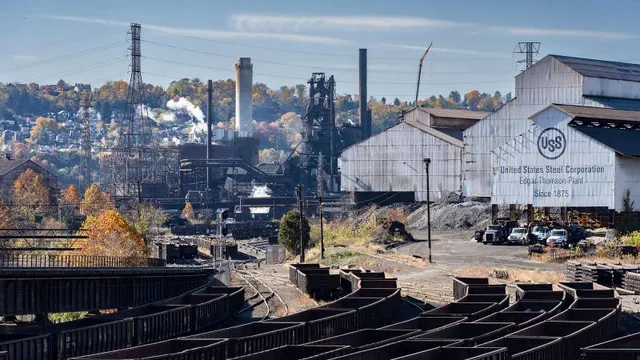
Nippon Steel proposes $11 billion investment to secure U.S. Steel deal
2025-05-23 20:20- Nippon Steel has proposed a new investment package of $14 billion for U.S. Steel's operations, including $4 billion for a new steel mill.
- The investment could lead to tens of thousands of job protections or creations, reflecting Nippon's commitment to U.S. jobs.
- This substantial financial pledge represents Nippon Steel's last effort to secure government approval amid ongoing national security reviews.
Express your sentiment!
Insights
In the United States, Nippon Steel has significantly increased its investment proposal to acquire U.S. Steel, proposing a total of $14 billion. This decision came after a series of lengthy negotiations aimed at securing approval from U.S. government officials. The revised offer includes a notable commitment of up to $4 billion dedicated to developing a new steel mill within the United States, reflecting Nippon Steel's intention to bolster the nation's steel production capabilities. Such a move is critically timed, given the rising demand for steel as a result of ongoing infrastructure projects inspired by bipartisan legislation. Over the past few months, Japanese executives from Nippon Steel have actively engaged with decision-makers in the Trump administration to advocate for their investment and proposed merger. With U.S. Steel's operations spread across several states, including Pennsylvania, Indiana, Michigan, and Ohio, the potential location of this new facility remains undetermined but is anticipated to be close to existing U.S. Steel plants. The negotiations took place amid a national security review that was scheduled to conclude shortly, underscoring the urgency of these discussions. This renewed investment pledge shifts Nippon Steel's original offer, which stood at $1.4 billion and later escalated to $2.7 billion. As the company aims to demonstrate a commitment to job creation and increased production in the United States, the extent and scale of the financial package might play a vital role in persuading the U.S. administration to approve the merger amid rising trade tensions and calls for preserving American steel production within national borders. Though the deal has faced considerable scrutiny from political leaders, including both President Trump and President Biden, Nippon Steel's leadership remains optimistic that the increased financial commitment will address concerns over national security and U.S. job preservation. The company believes that the continuity and enhancement of U.S. Steel's headquarters and workforce are imperative to the electoral landscape, especially in key swing states like Pennsylvania, where U.S. Steel's influence is substantial.
Contexts
The investment made by Nippon Steel in the United States steel industry is significant, as it not only reflects the strategic decisions of a leading global player but also has the potential to reshape the dynamics of the US steel market. Nippon Steel, as one of the largest steel producers in the world, has recognized the value of establishing a strong foothold in the US market amid rising demand for steel and the increasing complexity of global supply chains. The investment signals confidence in the US economy and its manufacturing sector, which has been recovering from previous downturns. This infusion of capital can provide necessary resources for technological advancements, infrastructure improvements, and enhancement of production capabilities within the US steel sector. The implications of Nippon Steel's investment extend beyond just capital inflow. It can stimulate local job creation, providing opportunities in communities where new plants or facilities may be established. The direct employment opportunities in steel manufacturing can lead to ancillary job growth in related industries such as logistics, equipment supply, and service sectors, thereby amplifying the positive effects on the local economies. Furthermore, the collaboration with domestic firms can lead to knowledge sharing and innovation, fostering a more competitive steel industry capable of meeting both domestic and global demands. However, challenges exist as Nippon Steel seeks to navigate the US steel industry's regulatory environment. The investment may face scrutiny in terms of trade policies and tariffs, especially considering the complex relationship between the US and various steel-exporting countries. Additionally, responses from domestic steel producers could range from collaboration to heightened competition, as they adapt to the new landscape created by Nippon Steel's entrance. It is vital for Nippon Steel to establish clear communication channels with stakeholders, including labor unions and local communities, to mitigate potential resistance and promote a sense of shared benefits. Ultimately, Nippon Steel's investment can be seen as a proactive approach to leveraging the growth potential within the US steel industry while addressing the challenges posed by a rapidly evolving market. The long-term success of this investment will significantly depend on how effectively Nippon Steel integrates its operations with existing entities in the US, aligns with local labor and economic expectations, and adapts to the changing regulatory landscape. If managed adeptly, the outcome could lead to a more robust, innovative, and competitive US steel industry, positioning it well in the global market.